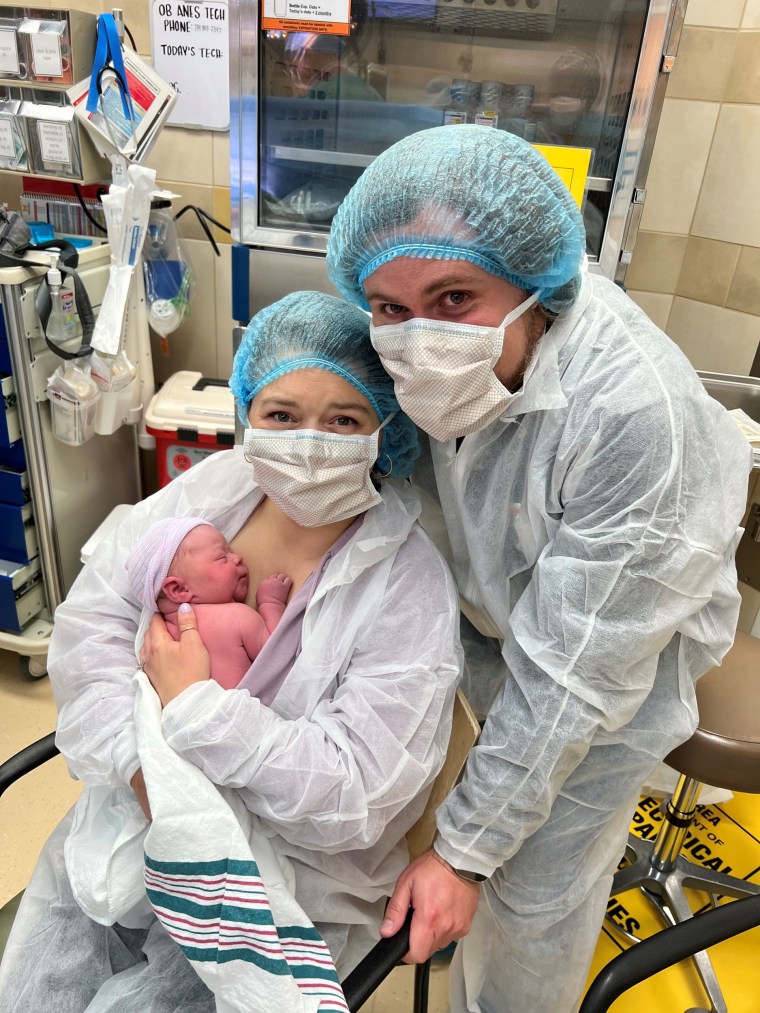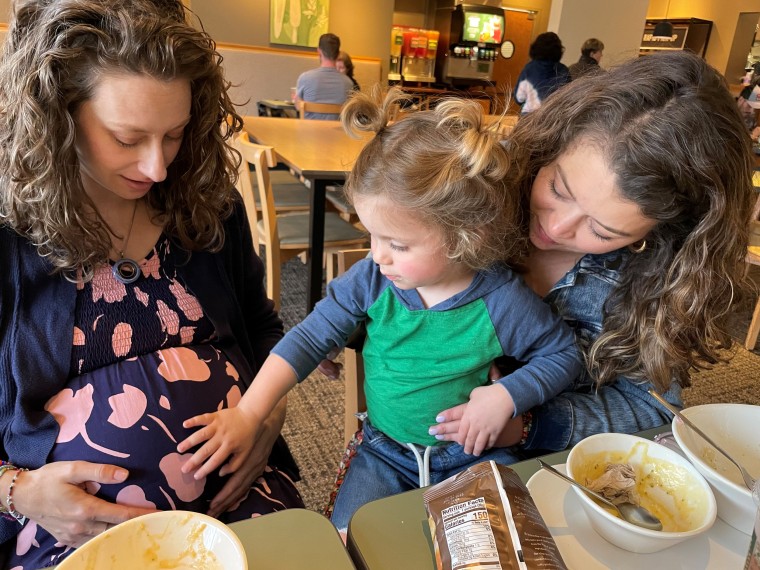Alex Kamer considers herself lucky — she didn’t have to fight a legal battle for the parental rights to her biological children.
Kamer and her husband, Alan Kamer, grew their family via surrogates; their younger son was born in June. But the couple lives in Michigan, where a 1988 law had banned the use of surrogacy contracts and compensated surrogacy. That had left uncertainty about what could happen once the baby was born last year.
Michigan was the last state in the country with such a law on its books, and for more than 30 years, those who violated it could, in extreme cases, face jail time. Couples in the state who sought to use surrogates could not pay them, and had to seek a prebirth order from a judge to ensure parental rights to their children. However, individual judges could choose not to approve an order, and if one wasn’t granted in time, families faced a protracted legal labyrinth or even a lengthy process to adopt their biological children.
“Surrogacy is hard — it’s expensive, it’s an emotional roller coaster, it takes up all of your energy for the years that you’re working towards it,” Kamer, 32, said. “And in Michigan, that added stress for those first seven or eight months of this pregnancy of not knowing if our names would be on his birth certificate.”
The state’s ban ended Monday, when Gov. Gretchen Whitmer signed a package of bills into law that do away with the ban on surrogacy contracts, in addition to bolstering safeguards for surrogates, access to in vitro fertilization and protections for LGBTQ+ parents.

The Democratic-backed package thrusts the state further into the national debate around government regulations of reproductive health care, which has expanded beyond abortion access. Heading into the 2024 presidential contest that could hinge on Michigan, both parties know that access to reproductive health care services will remain a key motivator for voters. And increasingly, advocates are calling attention to the overlap between abortion regulations and access to fertility treatments.
For Stephanie Jones, founder of the Michigan Fertility Alliance, the state’s new laws are the culmination of years of work. While in intensive care recovering from an ectopic pregnancy that almost took her life in 2018, she came to understand that she would need a surrogate if she wanted to have biological children. Then she learned of the difficulties of pursuing that option in Michigan.
“I never in my wildest dreams thought that I would be living in the only state in the country with a criminal ban on surrogacy,” Jones, 41, said, days before Michigan’s law was taken off the books.
To avoid the state’s surrogacy restrictions — which Jones described as “layering on trauma and heartache and trauma and heartache” to an already desperate situation — she and her husband had their second child via surrogacy out of state, a somewhat common practice for those with means.
In Kamer’s case, a congenital heart defect made it unsafe for her to carry a pregnancy. The couple’s older son was also born via a surrogate in another state. Then they succeeded in getting a prebirth order before their friend and surrogate, Leah Zientek, gave birth to their younger son. That enabled the Kamers to walk out of the hospital in Michigan with their child in their arms, even though their names weren’t on the newborn’s hospital bracelet.
“Anything could’ve happened,” Kamer said. “It’s crazy that we just got lucky. It shouldn’t be that way.”

Michigan’s new set of laws passed along mostly party lines, with most Republicans voting against it. Some detractors said the change commercialized surrogacy, while other critics seemed to take issue with the notion that it could make it easier for same-sex couples to become parents via surrogacy.
Republican state Sen. Thomas Albert said during discussion of the package that it was “riddled not only with practical problems but also … a revolutionary departure from the natural order.”
Explaining his vote against the bills, he added that if they had focused on a husband and wife who could not naturally conceive a child, “this would be an entirely different discussion.” But Albert said he feared that would be “the overwhelming minority of circumstances in which commercial surrogacy will be utilized.”
Right to Life Michigan, an anti-abortion nonprofit group, also opposed the package, saying in testimony to state lawmakers that “payment for services rendered turns the generous act of being an altruistic surrogate into a money-making proposition, which in turn creates a market that can and does exploit poor and vulnerable women.”
Michigan’s 1988 ban on surrogacy contracts came about, in part, as a response to the so-called “Baby M” legal case. At the time, the state was home to the world’s largest surrogate clinic — which was run by the lawyer who arranged the contract on which the high-profile lawsuit centered.
In that sense, the original law and its repeal are somewhat narrow in scope. But Whitmer has for years been a central player in the national conversation about reproductive rights. In her 2022 re-election bid, she doubled down on a pro-abortion message and quickly moved to enshrine abortion protections in the state after the U.S. Supreme Court overturned Roe vs. Wade.
Michigan’s new legislation, then, can be seen as a move to shore up another side of reproductive rights.
Jones said she sees policies governing access to abortion and fertility treatments as interconnected.
“Reproductive freedoms include fertility health care. It is a choice of when not to and when to have a baby,” she said, adding that her own journey to parenthood included both fertility treatments and emergency abortions to save her life.
“I am a classic example of needing the full spectrum of care,” Jones said.
That intersection was also highlighted in Alabama in February, when lawmakers moved to protect IVF access following a controversial judicial ruling that deemed embryos children.
Kamer said that she sees her experience with surrogacy as part of a larger national debate.
“I’m no expert, but I certainly think that this falls into the category of ‘women being able to make choices about their bodies and their families, however and whenever they need to,’” she said. “And I think a little piece of it now is made right in Michigan.”






